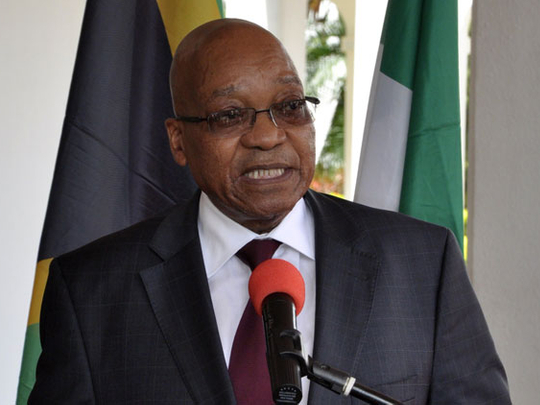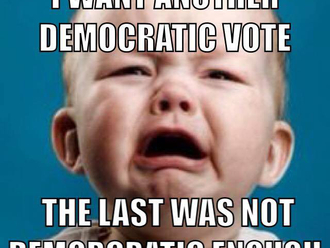
The head teacher at one of the many new schools built by Nelson Mandela’s African National Congress (ANC) held out his hands in anguish. “I don’t have enough textbooks and the president is spending all our money [£23 million; Dh128.67 million] on his personal palace?” A loyal ANC voter, he feels betrayed. As do millions of others — but not with the fact that the government of South African President Jacob Zuma has not solved all the country’s problems. The head teacher knew only too well that the awful legacy of apartheid — mass poverty, homelessness and, above all, the deliberate policy by ruling whites to ensure blacks had no skills — could never be overturned in 19 years of democracy. That was not his gripe. He was proud that the ANC had doubled the number of children at school and was now spending more per head on education than almost any other country in the world.
What pained him most was that ANC leaders now seemed to be preoccupied with corruptly enriching themselves at the taxpayers’ expense, not sticking true to Mandela’s values. “They are looting the country,” ANC members told me time and again as I travelled around this amazing and beautiful country. For me, it was a moving homecoming, going back to my old school in Pretoria to see it transformed into a vibrant symbol of the country’s rainbow multi-racialism; in my day in the early 1960s, apartheid decreed it was strictly whites-only.
I met Dikgang Moseneke, South Africa’s Deputy Chief Justice, in his chambers in the Constitutional Court that guards perhaps the most impressive constitution in the world. He emotionally recalled how, as a 15-year-old, he had been bolstered by the supportive presence in court of my anti-apartheid activist mother, Adelaine, who daily brought him a favourite bar of chocolate before he was despatched to Robben Island for 10 years’ imprisonment. Standing on the hallowed turf of the world’s most beautiful cricket ground, Newlands, with Table Mountain dreamily lording above it, were cricketers, black and white, warming up before a top match. This is what I had fought for in physically stopping whites-only South African cricket and rugby teams from touring Britain from the late 1960s.
The country remains joyously transformed from the dark and evil apartheid times. And yet the persistent, embittered sense of betrayal goes well beyond what I know only too well from my own 12 years as a British government minister: Seemingly inevitable voter disappointment and disaffection with all parties in all governments.
On Robben Island, I spoke to Ahmad Kathrada, one of the eight ANC leaders imprisoned there for 18 years with Mandela and perhaps the closest to him. Kathrada’s sense of let-down was palpable, as was that of Ronnie Kasrils, the hard-man intelligence chief of the ANC in its liberation decades and a minister until Zuma took over.
Lawson Naidoo, who ran the ANC’s office in London until the change, complained that new ANC legislation would give the state “far greater powers than even the apartheid government took upon itself, so the ability of the state to classify information is now actually greater than it was under the old legislation”. Naidoo added: “The real concern is that given the escalating levels of corruption and maladministration that we have seen over many years now, this legislation will be used to cover up and suppress information about mismanagement and corruption, whether it be at the national, provincial or local government level.” And as a card-carrying party member, he concluded sadly: “The ANC that is there today is an ANC that I no longer recognise.”
When I interviewed Zuma, he airily dismissed all these criticisms. On chairs set up on the lawn in front of his state residence overlooking Pretoria — a fine old period piece now called Mahlambandlopfu (“washing the elephant”) — he blamed “negative” media reporting.
Last August’s massacre of striking black miners at Lonmin’s Marikana platinum mine outside Rustenberg for many symbolised all that is wrong with Zuma’s South Africa today: “A watershed for the ANC”, Ronnie Kasrils told me bluntly. Filming at Marikana, I was told by lawyers representing families of the dead miners that the massacre was pre-planned. I saw chilling testimony that 22 of the dead were apparently executed in cold blood (away from the initial clash in front of the media, which had left 12 dead) out of a total of 34 fatalities, with 78 injured. Guns were planted on some of the corpses. I met witnesses who claimed to have been intimidated and even tortured by the police. This was all as bad as anything unleashed by the apartheid police.
Although a new black elite has done well, black workers have not benefited as much as they should have done from the country’s growth and stability since democracy came in 1994. This has to change, especially since South Africa is ranked high in both the UN’s measure of attractiveness for foreign direct investment and the World Bank’s Ease of Doing Business Index, with strong financial institutions, banks and stock market and a good corporate governance and regulatory framework.
For the ANC, the political challenges today are momentous. Can it make government a Mandela-like “cause” once again or has the sheer wear-and-tear of governing coupled with an “our-time-to-eat” temptation to self-enrich made that impossible? Mandela’s ANC inspired the world and although there has since been a collapse in values and integrity by self-interested party leaders locally and nationally, there remain many decent, dedicated and principled ANC members. Its policies are still based on the original values of the founders.
Cyril Ramaphosa’s recent election as Deputy President is potentially hugely significant: A former miners’ leader who remains a struggle hero despite his billionaire status and business credibility. Immensely able, he was Mandela’s personally favoured successor back in the 1990s. Perhaps we all expected too much of the ANC — for it to be different when, despite its deep moral and constitutionalist traditions, it is just as vulnerable to human frailty as political parties the world over (including Britain) — and with immensely more social inequalities than most to grapple with. There is furthermore a tendency to see post-apartheid South Africa in black and white: Either as “Mandela’s miracle” or as going down the pan. It is neither — and never was. I remain optimistic about its future.
— The Telegraph Group Limited, London, 2013
Former anti-apartheid leader and cabinet minister Peter Hain is MP for Neath. His film South Africa: The Massacre that Changed a Nation will be broadcast on BBC Two tomorrow.









